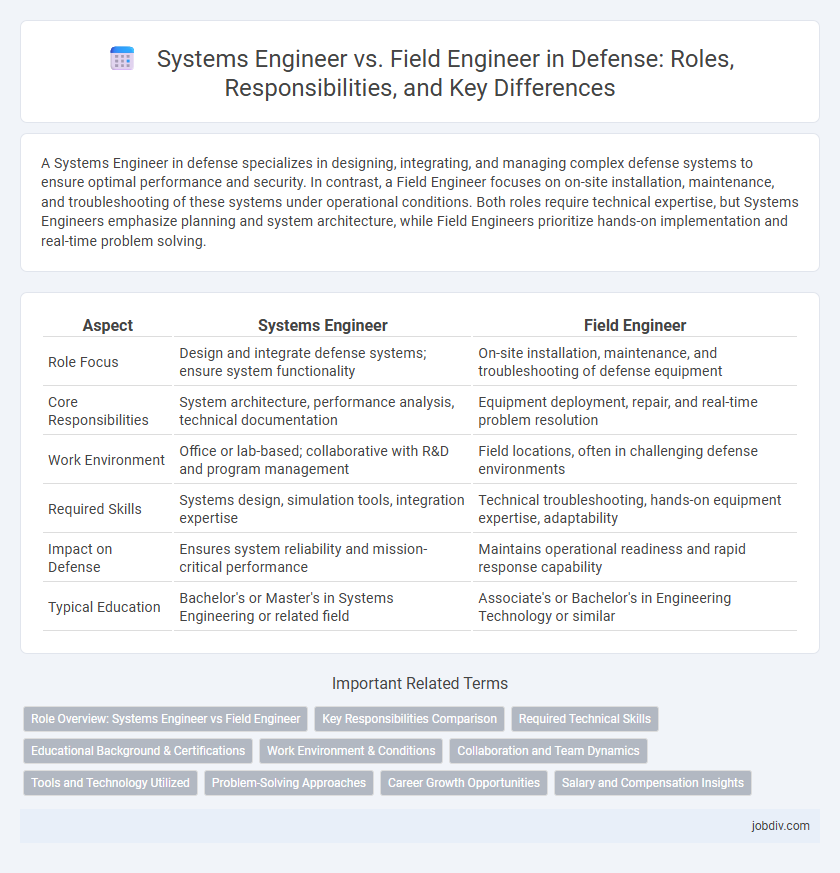A Systems Engineer in defense specializes in designing, integrating, and managing complex defense systems to ensure optimal performance and security. In contrast, a Field Engineer focuses on on-site installation, maintenance, and troubleshooting of these systems under operational conditions. Both roles require technical expertise, but Systems Engineers emphasize planning and system architecture, while Field Engineers prioritize hands-on implementation and real-time problem solving.
Table of Comparison
| Aspect | Systems Engineer | Field Engineer |
|---|---|---|
| Role Focus | Design and integrate defense systems; ensure system functionality | On-site installation, maintenance, and troubleshooting of defense equipment |
| Core Responsibilities | System architecture, performance analysis, technical documentation | Equipment deployment, repair, and real-time problem resolution |
| Work Environment | Office or lab-based; collaborative with R&D and program management | Field locations, often in challenging defense environments |
| Required Skills | Systems design, simulation tools, integration expertise | Technical troubleshooting, hands-on equipment expertise, adaptability |
| Impact on Defense | Ensures system reliability and mission-critical performance | Maintains operational readiness and rapid response capability |
| Typical Education | Bachelor's or Master's in Systems Engineering or related field | Associate's or Bachelor's in Engineering Technology or similar |
Role Overview: Systems Engineer vs Field Engineer
Systems Engineers in defense focus on designing, integrating, and managing complex defense systems, ensuring all components work cohesively within specifications and mission requirements. Field Engineers specialize in on-site installation, testing, troubleshooting, and maintenance of defense equipment, providing critical operational support under variable conditions. Both roles require strong technical expertise, but Systems Engineers emphasize system architecture and lifecycle management, while Field Engineers prioritize hands-on problem-solving and field operations.
Key Responsibilities Comparison
Systems Engineers in defense focus on designing, integrating, and optimizing complex defense systems, ensuring all components function harmoniously to meet mission requirements. Field Engineers handle on-site installation, testing, and maintenance of defense equipment, providing critical support during deployment and operational phases. The distinction lies in systems-level strategic oversight versus hands-on technical execution in the defense environment.
Required Technical Skills
Systems Engineers in defense require expertise in system integration, requirements analysis, and modeling tools like SysML to design and optimize complex defense systems. Field Engineers must possess strong troubleshooting skills, hands-on experience with military hardware, and proficiency in diagnostic tools to support deployment and maintenance. Both roles demand knowledge of communication protocols and cybersecurity measures to ensure robust and secure operation of defense technologies.
Educational Background & Certifications
Systems Engineers in defense typically require a bachelor's degree in systems engineering, electrical engineering, or aerospace engineering, often complemented by certifications like INCOSE CSEP or PMP to validate expertise in complex system design and integration. Field Engineers usually hold degrees in mechanical or electrical engineering with practical certifications such as OSHA safety, NCEES PE licenses, or vendor-specific qualifications emphasizing hands-on installation, maintenance, and troubleshooting of defense equipment. Both roles demand continuous professional development tailored to defense technology standards and compliance requirements.
Work Environment & Conditions
Systems Engineers in defense typically operate in controlled office or lab environments, focusing on design, integration, and testing of complex defense systems. Field Engineers work on-site at military bases or deployment locations, managing installation, troubleshooting, and maintenance under variable, often harsh conditions. The contrasting environments demand Systems Engineers excel in analytical problem-solving and simulation tools, while Field Engineers require adaptability to unpredictable operational challenges and hands-on technical skills.
Collaboration and Team Dynamics
Systems Engineers in defense projects architect complex solutions by integrating various subsystems, ensuring compatibility and mission readiness. Field Engineers execute deployment and maintenance tasks on-site, providing critical feedback that informs system refinements and operational adjustments. Their collaboration fosters agile problem-solving and optimizes team dynamics, enhancing overall defense project efficacy and mission success.
Tools and Technology Utilized
Systems Engineers in defense primarily leverage advanced simulation software, model-based systems engineering (MBSE) tools, and integrated development environments to design and optimize complex defense systems. Field Engineers utilize diagnostic instruments, portable test equipment, and ruggedized communication devices to install, maintain, and troubleshoot defense hardware directly in operational environments. Both roles require proficiency in specialized defense technology platforms, but Systems Engineers focus on virtual system integration while Field Engineers emphasize hands-on deployment and real-time problem resolution.
Problem-Solving Approaches
Systems Engineers in defense typically employ a holistic, model-based problem-solving approach, leveraging systems architecture and integration to identify and resolve complex technical issues. Field Engineers focus on practical, on-site troubleshooting and immediate corrective actions, using hands-on diagnostics and repair techniques to maintain operational readiness. Their complementary problem-solving methods ensure both strategic planning and rapid response in mission-critical defense environments.
Career Growth Opportunities
Systems Engineers in defense typically experience accelerated career growth due to their involvement with high-level project design, integration, and cross-disciplinary collaboration in complex weapon systems. Field Engineers gain essential hands-on expertise and operational problem-solving skills, often leading to specialized roles in maintenance management or technical leadership within military bases and deployment scenarios. Both paths offer distinct advancement opportunities, with Systems Engineers favoring strategic and managerial positions, while Field Engineers excel in technical specialization and on-site leadership roles.
Salary and Compensation Insights
Systems Engineers in defense typically command higher salaries than Field Engineers due to their specialized skills in designing and integrating complex defense systems. According to recent industry reports, Systems Engineers earn an average base salary ranging from $90,000 to $120,000 annually, while Field Engineers average between $70,000 and $95,000. Compensation packages for Systems Engineers often include performance bonuses and stock options, reflecting the critical role they play in defense project success.
Systems Engineer vs Field Engineer Infographic

 jobdiv.com
jobdiv.com